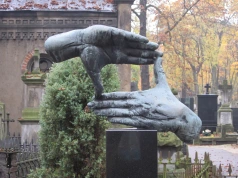• BBC R3 ‘Polska!’: Brochure & Previews
Thursday, 21 November 2013 Leave a comment
 For its main Polska! image, the BBC chose a still photograph by Eustachy Kossakowski of a 1967 happening by one of Poland’s most exploratory theatre directors, Tadeusz Kantor. It was taken at Osieki on the north-west Polish coast during ‘A Sea Concert’. Kossakowski took a number of photos of the event. Here are a couple, including the one which furnished Polska! with its striking image:
For its main Polska! image, the BBC chose a still photograph by Eustachy Kossakowski of a 1967 happening by one of Poland’s most exploratory theatre directors, Tadeusz Kantor. It was taken at Osieki on the north-west Polish coast during ‘A Sea Concert’. Kossakowski took a number of photos of the event. Here are a couple, including the one which furnished Polska! with its striking image:
Ironically, although it was understandable for practical reasons on radio, Kantor did not feature in the drama coverage of Polska!. The ‘conductor’ was the Polish artist Edward Krasiński, best known perhaps for his introduction a year later of a wide blue sellotape line that wove its way through his installations.
Here is the complete publicity brochure for the festival.
Early publicity was key. But there is always one disaffected voice carping from the sidelines, warping both the intention and the actuality. In this instance, it was Dermot Clinch in his ‘A Critical Guide: Staying In (Friday)’, The Independent on Sunday, 14 November 1993:
Polska! (7.30pm-12.30am R3). Gone are the days of single programmes based simply on a single idea. It’s theme nights and seasons all the way. Today, the start of Polish fortnight – and what more beguiling hook than the “75th anniversary of the reconstitution of Poland as an independent state”? Including: Szymanowski’s String Quartet no.2 (7.45pm) and Lutoslawski’s Fourth Symphony (11.15pm). And then the big names: Zarebski, Krupowicz, Palester…
The anticipatory response elsewhere was overwhelmingly positive. Here are six preview pieces (I’ll post reviews later): one by myself, one from the radio critic of The Sunday Times, a short contribution from the senior music critic from The Guardian, plus an interview with me in London’s Dziennik Polski and two pieces from Warsaw’s Gazeta Wyborcza and Rzeczpozpolita.
• Adrian Thomas, ‘Cultural glories of the great survivors’, The Times, 19 November 1993
• Ewa Turska, ‘Sezon polski w BBC’, Rzeczpozpolita, 19 November 1993
• Dorota Szwarcman, ‘Sezon polski w BBC 3’, Gazeta Wyborcza, 19 November 1993
• Paul Donovan, ‘Radio Waves: Poles without politics’, The Sunday Times, 21 November 1993
• Tomasz Walkiewicz, ‘Jestem zauroczony tym krajem’ (interview with Adrian Thomas), Dziennik Polski, 22 November 1993
• Andrew Clements, ‘Diary: Polishing up Radio 3’, The Guardian, 23 November 1993

















